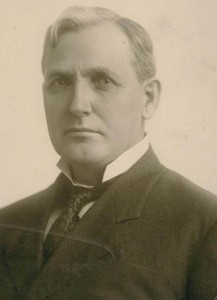In 1907, newly elected California Governor James Norris Gillett asked the California legislature to address restraints on trade. California state Senator John A. Cartwright responded with a bill patterned after a federal antitrust bill introduced by Senator John Reagan of Texas in 1889. Although Senator Reagan's bill was to be superseded at the federal level by a bill introduced by Senator John Sherman of Ohio, it has survived in California as the Cartwright Act of 1907, now codified at Business & Professions Code Sections 16700 et seq. The Cartwright "generally outlaws any combinations or agreements which restrain trade or competition or which fix or control prices". Pacific Gas & Electric Co. v. County of Stanislaus 16 Cal.4th 1143, 1147 (1977). The Cartwright Act bans combinations, but single firm monopolization is not cognizable under the Cartwright Act. State of California ex rel. Van de Kamp v. Texaco, Inc. 46 Cal.3d 1147, 1163 (1988).
Suppose that a company lawfully acquires a competitor. Can the activities of the two companies in anticipation of the merger constitute a conspiracy in restraint of trade under the Cartwright Act? The Court of Appeal tackled this question last year in Asahi Kasei Pharma Corp. v. CoTherix, Inc., 204 Cal. App. 4th 1, 6 (Cal. App. 1st Dist. 2012). The genesis of this decision was an agreement between Asahi Kasei Pharma Corp. and CoTherix, Inc. pursuant to which CoTherix was to commercialize an Asahi pharmaceutical product, Fasudil, in the United States. After being acquired by a competitor of Asahi, CoTherix gave notice that it was discontinuing the agreement. Asahi sued. The trial court granted summary judgment on Asahi's Cartwright Act claims, ruling that "Defendants have met their initial burden under [Code of Civil Procedure section] 437c[, subdivision] (p)(2) of showing that this cause of action has no merit because the Cartwright Act does not apply to a merger . . . and the complaint does not allege any pre-merger violation of the Cartwright Act." Id. at 7. The Court of Appeal, in an opinion by Justice Terence L. Bruiniers, affirmed, holding:
The essence of Asahi's claim is that CoTherix breached the terms of the Licensing Agreement, that Actelion induced it to do so, and that development of Fasudil as a competitive product was “thwarted” as a result. What the undisputed evidence shows, however, is that development of Fasudil, at least by CoTherix, was thwarted by Actelion's acquisition of CoTherix. While Asahi presented voluminous evidence relating to the harm which it claims to have suffered as a result, the Cartwright Act, like all antitrust laws, is about " ' " 'the protection of competition, not competitors.' " ' "
Id. at 20 (citations omitted).
Asahi Finds A Morning Sun
It turns out that all was not lost for Asahi, for it had some other arrows in its quiver. More about round two in tomorrow's post.
Governor James Gillett



.png?width=100&height=100&name=corporate_law_blogs%20(1).png)